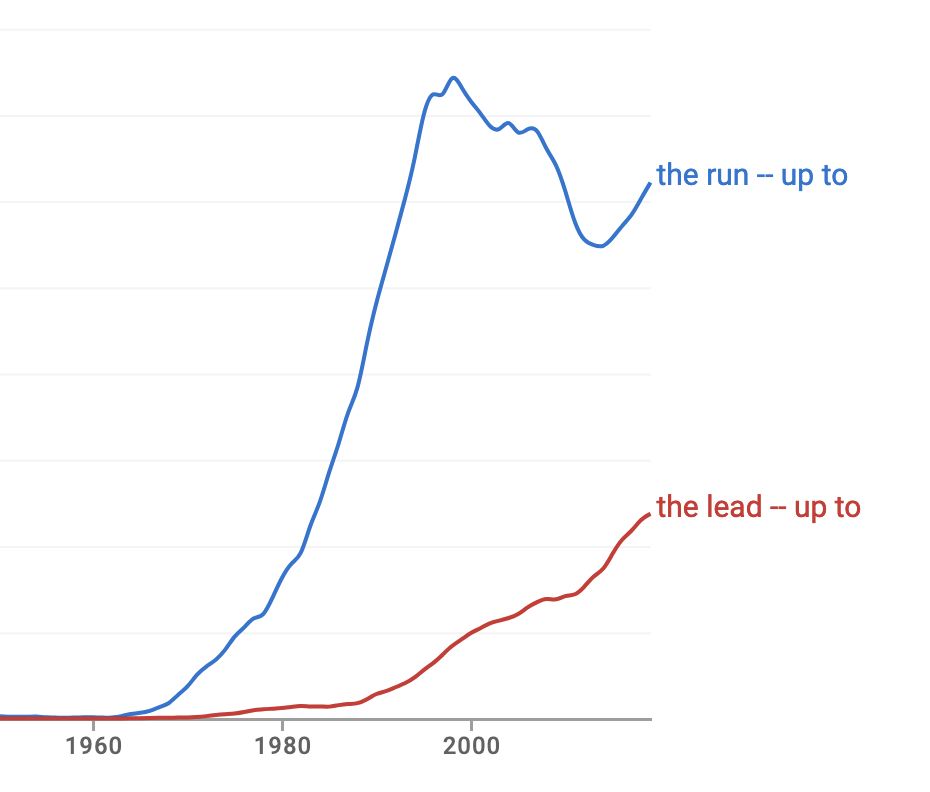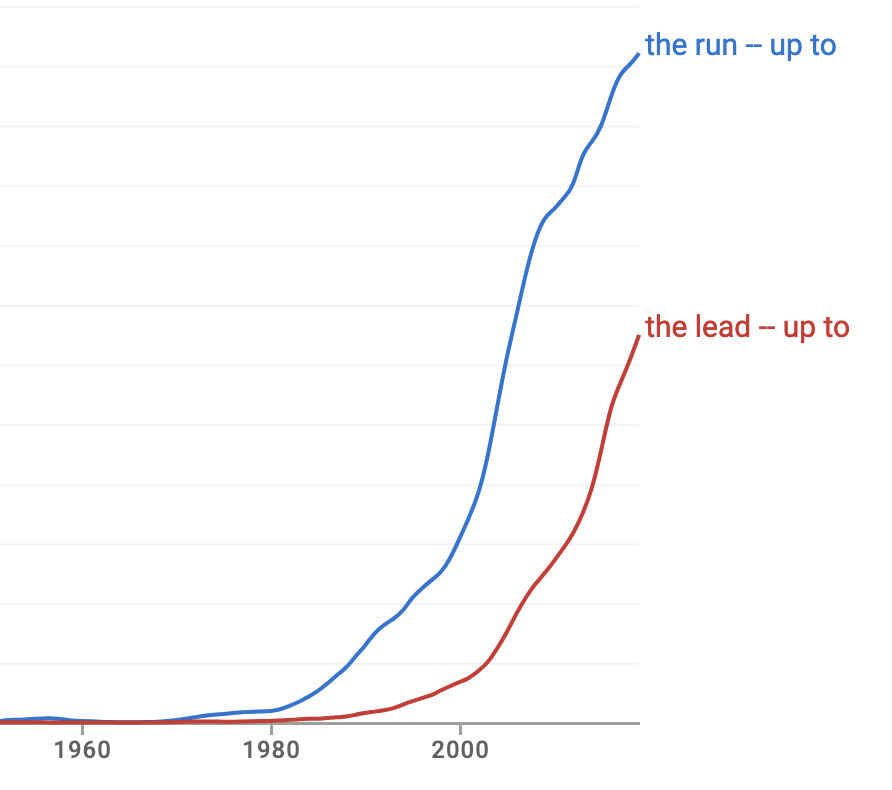One of the first posts I did for this blog was on the expression “the run-up to,” meaning a preliminary period. It was a really short post, as was my custom in those days, so here’s some more about it.
“Run-up” emerged in the nineteenth century in dog racing, to mean the section of the chase up to the first turn. Next, it referred to a preliminary run taken by an athlete before a long jump or—most common in recent years—a cricket bowler’s throw. The figurative use—”A period of time or series of occurrences leading up to some significant event”—arrived no later than 1961, when The Times of London referred to “the run-up to the next general election.”
The term became popular in the U.S. because it filled a need. Early In 2003, it became clear that the United States would invade Iraq. Months passed; we did not invade. Then we did. Journalists again faced a question: what to call that preliminary period? In September 2003, the New York Times’ Thomas Friedman chose a Britishism to offer a collective answer that now appears inevitable, referring to “how France behaved in the run-upto the Iraq war.”
“Run-up” quickly began to be very widely used. Ngram Viewer shows a doubling of frequency in the U.S. between 2000 and 2006. (Note that another meaning of the term is traditionally more common in the U.S.: a rapid rise in price or some other measure. Thus the Times reports that the pandemic years saw “a run up on home prices at a pace never seen before in U.S. history.”)
In America, from 2003 till about 2010, the period-time “run-up” was most commonly used to refer to the months before the Iraq invasion. But then it started to spread to other contexts, the Times writing in 2011, “The Packers’ report is more than a novelty in the run-up to their playing the Pittsburgh Steelers in the Super Bowl on Feb. 6.” The ProQuest Recent Newspapers database shows 1,757 American uses between 2000 and 2022, including references to the Olympics, Christmas, the Capitol riots, and (back to the future), the Russian invasion of Ukraine.
I believe “lead-up” means the same thing as “run-up.” It emerged about the same time (the OED has a 1959 citation), but took longer to establish itself and still lags behind “run-up” in frequency of use. Here’s the Ngram Viewer chart for the two phrases in British books:

The graph for American usage shows the same pattern.

An early “lead-up” in the New York Times. came in the 1977 transcript of the interview between (the British) David Frost and Richard Nixon, where Frost refers to “the lead up to the China breakthrough.” The first American to use it in the paper seems to be erstwhile language columnist William Safire in 1984, who didn’t comment on the phrase but merely used it in referring to the “lead up” to a joke’s punchline.
That was then, this is now. “The lead-up to” appeared 154 times in the Times in 2023. My favorite is an article about the sex lives of an insect called Neotrogla, the females of which have a penis-like anatomical feature. The article notes researchers found
“two groups of muscles that help female Neotrogla control their penislike gynosomes. One set of muscles was taut in the copulating pair of barklice when the penislike structure was inflated. The other set of muscles, which hooks the gynosome to the female’s internal organs, was active in the flaccid gynosome of the solo Neotrogla specimen. The researchers concluded that these muscle groups helped the females both to unfurl their gynosomes in the lead-up to their prolonged mating sessions and to retract their engorged gynosomes afterward.”


Cricket bowlers do not throw, they bowl. The clue is in the name. Throwing would make the ball a no-ball and an extra run would be scored while the batsman (although these days I thinK we’re supposed to use the non gender specific “batter”) gets another ball added to the over.
The other cricket-specific terms are gender-neutral too: bowler, fielder, wicketkeeper, umpire, so why shouldn’t ‘batter’ be?
there’s also the British expression “run-in” which means the final phases of a process. it’s commonly used in the sports world to describe the games in the final few weeks of a season. I could see that being used in North America – and it’d likely be the sports journalists who would borrow it
A new one to me–I will be on the lookout. The “run-in” I’m familiar with is a fight or argument. The OED identifies it as originally U.S. and has a first citation from 1894. Seems like it’s crossed over to Britain.
I’m a Brit and the only sense of “run-in” I’m familiar with is the “argument” one.
Let’s keep open the batsman/batswoman option. Batter is for dipping food in before frying it.